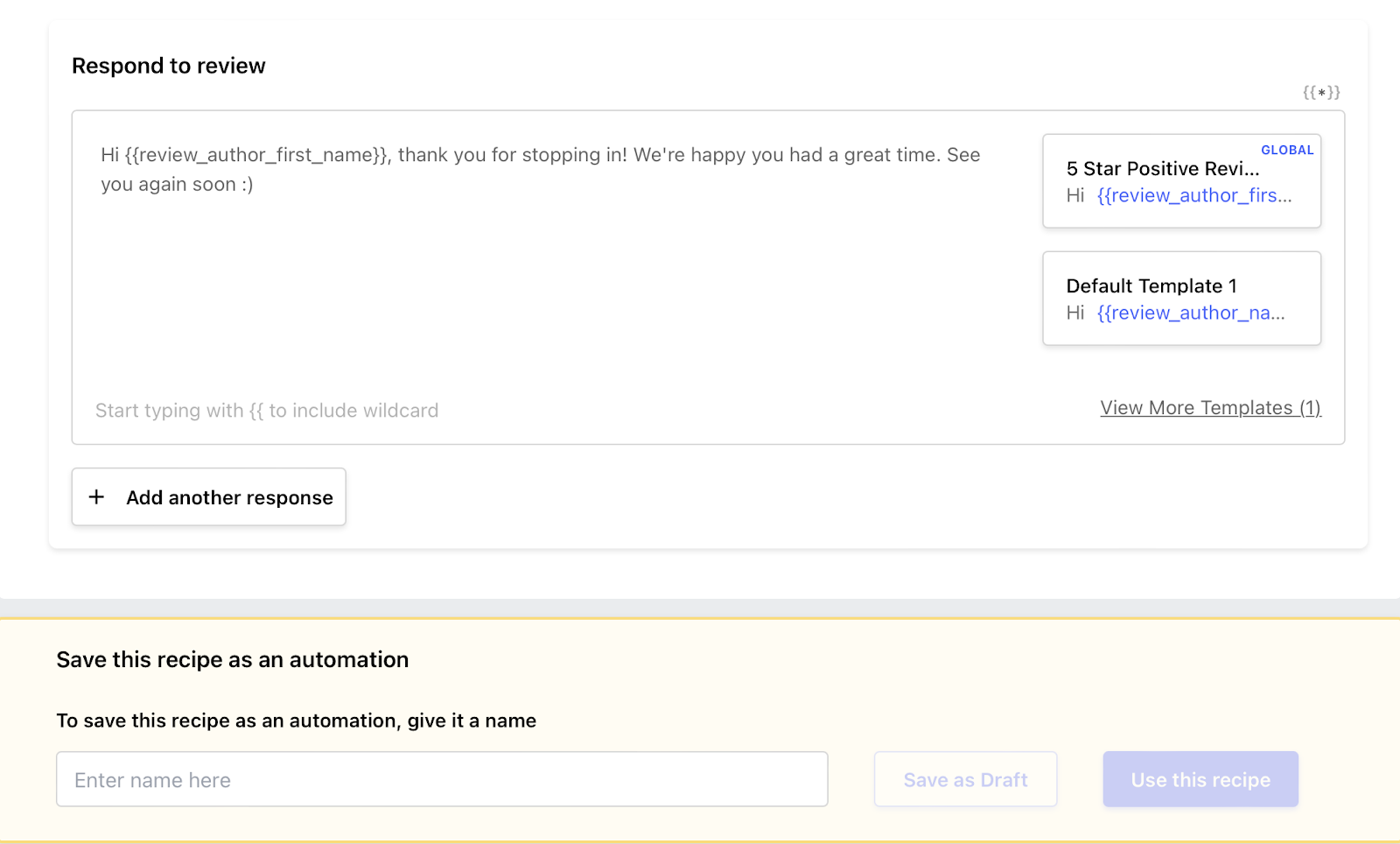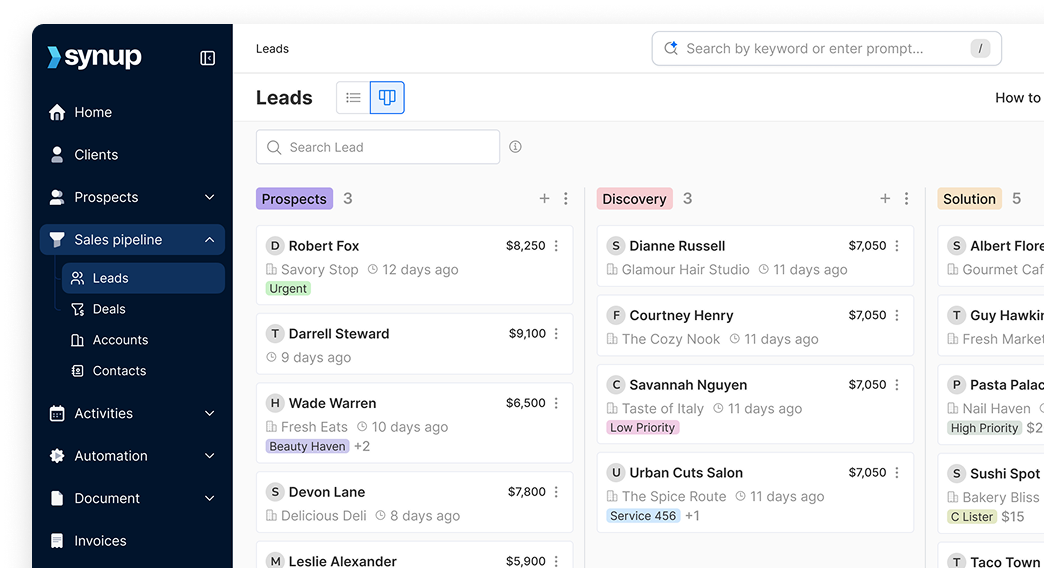So verwalten Sie die Online-Reputation
Manage your online reputation to retain existing clients, attract new ones, and establish yourself as the go-to service provider in your niche.

Social media and review sites have significantly influenced the online reputation of many agencies, contributing to both their success and downfall.
The stories told about your brand on social media can either make or break your business. Just one negative review from an unhappy client can have a devastating impact on your reputation.
This is why effective online reputation management has become crucial, especially for businesses with multiple locations, as nearly all consumers rely on reviews and social media to research companies.
Global executives estimate that, on average, 63% of their company’s market value is tied to its overall reputation. That makes sense, considering that an overwhelming majority (89%) of consumers make an effort to consult online reviews before purchasing a product.
Nearly all of them believe what they see online about your brand.
Before diving into how you can manage online reputation, let's redefine it for better understanding.
Online reputation is the overall impression that search engine results, reviews, ratings, and social media portray of your business in its locations.
Since your online reputation precedes you, no matter your current standing, there’s always room for improvement. You have the ability to influence how people view your brand.
About 49% of consumers trust online reviews as much as personal recommendations. So, if you run a multi-location business, gaining customer trust and driving more sales should be top priorities. A positive online reputation is essential to achieving these goals. By consistently maintaining and enhancing your reputation, you're already halfway toward building strong credibility and reaching long-term success.
Read on to learn why online reviews management is important for agencies and how you can take control of yours.
Why Take Control of Your Online Reputation
In this highly connected world, while you can’t control what people say about your brand, you do have control over how you respond.
Reviews provide invaluable insights into where your services excel and where they may lag. Moreover, they offer a competitive edge and attract potential clients.
A PowerReviews survey revealed that nearly half (45%) of online shoppers won’t purchase from a brand without reviews. Worse still, if customers are dissatisfied with one location, they might avoid your entire brand, not just that particular branch. Negative reviews can snowball, drastically increasing the chances of losing potential clients across all your locations. This is why it is essential to manage online reputation effectively. Your ability to address concerns, show responsiveness, and maintain a positive public image can make all the difference in building lasting trust with your audience.
Here are some important reasons why individuals who run a multi-location brand should manage their online reputation.
Online Reputation Impacts Trust
Since your online reputation encompasses all the stories being told about your services, there is no doubt that a good reputation is crucial for building trust with your clients.
Clients are heavily influenced by what they see online, so online reputation management is essential for gaining new clients, retaining existing ones, and boosting your sales.
A good reputation will increase your online visibility, attract new clients, and strengthen trust with your existing ones. Positive reviews and profiles help you stand out and can lead to more business.
A Positive Reputation Will Create a Strong Competitive Advantage
A good online reputation will give you an advantage over other competitors in the game. Positive reviews and high ratings will help you build loyalty quickly with potential customers and can help you retain them.
Online reviews management in review sites and social media can also boost your brand awareness and give you a valuable edge, helping you to attract more clients than others.

Moreover, actively engaging on review sites and social media platforms can enhance your brand's visibility and credibility. Responding to customer feedback, both positive and negative, demonstrates that you value their input and are committed to continuous improvement.
By consistently nurturing your online reputation, you gain a valuable edge in attracting more clients, retaining them longer, and fostering long-term business relationships. This can significantly boost your brand awareness, making you the preferred choice in your industry.
Online Reputation Can Build Your Brand Image and Perception
How your brand is portrayed online through reviews, social profiles, and search results will impact how potential clients perceive it. A good reputation signifies that you are reliable, offer high-quality content, and, most importantly, provide great customer service.
Consistently earning positive reviews on platforms like Google, Facebook, and niche review sites can strengthen your credibility, especially if you are a brand owner with multiple locations.
When potential clients see that others have had positive experiences with your brand, they are more likely to choose your products or services over those of your competitors.
Investing in your reputation monitoring is not just about managing perceptions—it's a strategic move that can drive growth, customer loyalty, and everlasting success.
Provides More Control Over Your Online Presence
When you maintain a complete profile and manage online reputation across search engines and listings, you will have full control over the information disseminated online about your brand. This will enable you to promptly address inaccurate or outdated content and provide the right message.
When you have control over your online reputation, you can shape narratives about your brand. You can highlight positive aspects, share success stories, and showcase clients’ testimonials, all these can contribute to building a stronger online reputation.
Regular reputation monitoring also allows you to keep track of clients’ reviews and mentions so you can respond on time. When clients see that you are engaged and responsive, you are more likely to see your brand as reliable and customer-focused.
Online Reputation Attracts Qualified Leads
Reviews serve as powerful social proof. Positive reviews and high ratings can attract new prospects without costing you any fees, and it will be much easier to convert a one-time visitor into a long-term loyal client when you have a good reputation.
Online reviews management over reliable sources like Google will help you target ads that encourage past clients to share their experiences and provide testimonials about your work for and with them.
Increase Client Satisfaction
Proactively seeking reviews shows that you care about satisfying your clients’ needs. Additionally, following up after a project to learn about pain points can help you refine your services.
By taking steps to manage online reputation, you can resolve issues openly, which builds confidence, while closing surveys demonstrate that you’ve learned from the experience. Personalized post-purchase communications will make your clients feel valued, increasing their loyalty and satisfaction, which in turn leads to more referrals and revenue.
Demonstrates Your Customer Service
As a business owner with multiple locations, prioritizing excellent customer service is essential for promoting referrals. When you actively manage online reputation by responding to all reviews—both positive and negative—you send a clear message to your clients that you value their feedback.
Addressing even minor complaints can help prevent client loss and enhance your overall customer service. Additionally, handling complaints privately and professionally can transform unhappy customers into loyal advocates.
A Positive Reputation Will Boost Your Search Engine Visibility
Over time, online searches have become the initial step in acquiring new clients, making visibility in search results crucial for your business. Regularly managing your business profiles on major listing sites can enhance your local SEO ranking, allowing you to reach more clients organically.
Enhance Marketing and Advertising Results
Online reputation management serves as a powerful marketing tool, enhancing your other efforts and yielding a higher return on investment (ROI). Positive reviews and profiles make it easier to retarget customers with special offers.
Creating content that showcases your specialized services can help establish your authority as an industry expert. Additionally, engaging with clients on social media allows you to transform discussions into brand advocacy.
Surveys can further help you understand genuine customer needs, which you can incorporate into your advertising strategies. Altogether, these actions expand your reach and improve the effectiveness of your marketing efforts over time.
A Positive Online Reputation Will Attract Top Talents
The impact of online reputation management goes beyond ratings and reviews, leading to more clients. Having a positive online reputation demonstrates that you are a leader in your niche with satisfied clients and a positive work environment.
This can attract skilled candidates who want to work for a successful brand.

Your online reputation can also spike a feeling of fulfillment in your current employees, making them feel proud to work for a well-known brand, which can motivate them to perform well and provide excellent services.
Improves Internal Processes
Feedback from clients is an excellent way for you to identify shortcomings in your service delivery and make amends where necessary. This will prevent recurring mistakes and positively impact continuous improvement in your service delivery.
Additionally, by taking the time to manage online reputation and actively seeking and responding to feedback, you can generate positive reviews that streamline your workflow, resource allocation, and technology investment. Positive feedback from clients and the industry can directly contribute to this process.
Enable Data-Driven Decision Making
Online reputation management tools will provide continuous information on reviews, social activity, keyword rankings, and more. This detailed data offers deep insights into customer preferences, helping you optimize your services.
Comparing your performance to competitors can reveal opportunities for differentiation. Feedback can also help you fine-tune your reputation campaigns.
Trends in customer sentiment can indicate changes in satisfaction, guiding process improvements. These insights are essential for creating personalized digital experiences and strategic planning for long-term growth.
Steps to Manage Your Online Reputation
Online-Reputationsmanagement ist keine einmalige Aufgabe, sondern ein schrittweiser Prozess, der effizient befolgt werden muss.
Hier sind die Schritte, die Sie ergreifen können, um Online-Reputation verwalten:
Schritt 1: Konsistentes Management
Die erste Strategie zur Verwaltung Ihrer Online-Reputation besteht darin, sie zu kontrollieren, da sie bereits in Aktion ist. Sie können dies tun, indem Sie Ihre Service-Keywords auf verschiedenen Bewertungsseiten, Social-Media-Plattformen, Blog-Websites und anderen Quellen überwachen. Auf diese Weise können Sie die positiven und negativen Kommentare zu all Ihren Markenstandorten online herausfiltern.
Du kannst dirigieren Überwachung des Rufs von:
- Verwenden Sie Google Alerts, um Ihre Keywords zu verfolgen, die sich auf Ihr Unternehmen beziehen.
- Die Überwachung erfolgt häufig mit den am häufigsten verwendeten sozialen Netzwerken wie Facebook, Instagram und X (früher bekannt als Twitter).
- Überwachung aller Abfragen zu Ihren Markenstandorten in den Suchmaschinen.
- Um detailliertere Ergebnisse zu erhalten, empfiehlt es sich, eine Online-Reputationsmanagement Werkzeug.
Sie müssen diesen Prozess kontinuierlich fortsetzen, um weiterhin aus dem Feedback des Kunden zu lernen und es umgehend zu beachten. Dieser Prozess ermöglicht es, Schwächen und Möglichkeiten zu identifizieren, die einem helfen könnten, aktiv zu bleiben.
Schritt 2: Antworten Sie auf die Online-Bewertungen
Nach der Identifizierung negativer und positiver Kommentare durch Überwachung ist der nächste Schritt in Online-Reputationsmanagement besteht darin, eine durchdachte und professionelle Antwort zu geben.
Wenn Sie professionell und gewissenhaft auf Bewertungen reagieren, zeigen Sie, dass Sie sich wirklich um Ihre Kunden kümmern.

Im Folgenden finden Sie einige bewährte Methoden für die Beantwortung von Bewertungen:
- Antworten Sie auf jeden Kommentar, ob positiv oder negativ, um zu zeigen, dass Sie das Feedback zur Kenntnis nehmen und besorgt sind.
- Bei jeder negativen Bewertung sollte die erste Grundreaktion schnell und nicht defensiv erfolgen. Zu den weiteren Richtlinien gehört, professionell, höflich und so höflich wie möglich zu antworten.
- Beim Umgang mit negativem Feedback sollte aus mehreren Gründen vorsichtig damit umgegangen werden, insbesondere, weil das Feedback auf einen schwerwiegenden Fehler hingewiesen hat, der korrigiert werden muss.
- Bieten Sie bei Bedarf relevante Lösungen und Vergütungen an.
- Wenn Kunden diese Art von Kontakt aufnehmen, freuen sich die meisten darauf, innerhalb von 48 Stunden eine Antwort auf ihr Anliegen zu erhalten. Sie sollten diese Erwartung erfüllen, um eine zufriedenstellende Lösung für ihre negativen Bewertungen zu finden und Online-Reputation verwalten.
Schritt 3: Interagieren Sie mit Kunden auf Social-Media-Plattformen
Soziale Medien haben sich erheblich erweitert und sind das Hauptmedium für Online-Reputationsmanagement das kann sich an allen Standorten positiv oder negativ auf Ihre Marke auswirken.
Sie können mit Ihren Kunden in sozialen Medien in Kontakt treten, indem Sie:
- Entwickeln Sie tägliche Social-Media-Beiträge zu Dienstleistungen, die Sie anbieten können.
- Beantwortung von Kundenfragen, Feedback und negativem Feedback.
- Sicherstellen, dass Kunden positives Feedback und Zeugnisse zu den angebotenen Dienstleistungen geben.
Soziale Medien sind eine Plattform, auf der Kunden interagieren. Wenn Sie sie nutzen, um mit Ihren potenziellen Kunden in Kontakt zu treten, können Sie Ihre Sichtbarkeit in ausgewählten Communities verbessern.
Schritt 4: Entwickeln Sie eine Methode zur Überwachung und Aufrechterhaltung des Suchmaschinenrankings
Es ist zwar immer von Vorteil, darüber nachzudenken Verwaltung von Online-Bewertungen und das Feedback von Kunden zu den Produkten und Dienstleistungen, die Sie anbieten, ist genauso wertvoll, wenn nicht sogar noch wertvoller, sich auf die Suchmaschinenoptimierung zu konzentrieren und dafür zu sorgen, dass der erste Eindruck zählt.
Sie müssen davon ausgehen und davon ausgehen, dass ein höheres Ranking in Suchmaschinen zu einem erheblichen Wachstum potenzieller Kunden führen kann.
Identifizieren Sie die Suchbegriffe, die sich auf Ihren Service, Ihren Standort und andere Faktoren beziehen, nach denen Kunden wahrscheinlich suchen werden.
Backlinking ist ein weiterer wichtiger Aspekt der Suchmaschinenoptimierung, der Aufmerksamkeit bedarf. Wenn Sie hochwertige Backlinks von anderen Websites erhalten, die mit Ihrer Nische zu tun haben, und von maßgeblichen Websites innerhalb der Branche, werden Suchmaschinen Sie als Autorität in dieser bestimmten Nische betrachten.
SEO sollte regelmäßig durchgeführt werden, um sicherzustellen, dass Ihre organische Suche gut sichtbar ist und potenzielle Kunden Sie online an mehreren Standorten finden können.
Schritt 5: Verwenden Sie die Online-Reputationsmanagement-Software
Um Ihre Online-Präsenz effizient und professionell zu verwalten, ist es wichtig, regelmäßig alle Aspekte des Prozesses zu überprüfen und bei Bedarf geeignete Maßnahmen zu ergreifen.
Anstatt sich auf traditionelle Methoden zu verlassen, können Sie Online-Reputation verwalten durch den Einsatz effektiver Tools und Dienste.
Diese Tools bieten umfassende Lösungen zur Reputationsverfolgung, mit denen Sie negative Kommentar-Threads effektiv überwachen und darauf reagieren können.
Mit diesen Ressourcen wird die Nachverfolgung von Bewertungen von verschiedenen Plattformen übersichtlicher, sodass Sie mit Ihren Kunden in Kontakt treten und Vertrauen und Glaubwürdigkeit aufbauen können.
Überwachung der Reputation ermöglicht es Ihnen, Ihr Markenimage zu kontrollieren, indem Sie Trends erkennen, die Kundenstimmung zu Ihren Dienstleistungen verstehen und die Auswirkungen negativer Kommentare minimieren, auf die Sie stoßen.
Es ist wichtig zu beachten, dass diese Tools unglaublich nützlich sind und den Prozess vereinfachen Online-Reputationsmanagement und Pflege positiver Beziehungen zu Ihren Kunden.
Sie können dies erreichen, indem Sie Ihre Service-Keywords auf Bewertungsseiten, sozialen Medien, Blogs und anderen Plattformen verfolgen. Auf diese Weise können Sie positive und negative Diskussionen über Ihre Marke an allen Ihren Online-Standorten identifizieren.
Zusammenfassen
Zusammenfassend lässt sich sagen, dass die Verwaltung Ihrer Online-Reputation von entscheidender Bedeutung ist, insbesondere in der heutigen Situation, in der Kunden gründlich nach Marken suchen, bevor sie sich für Produkte und Dienstleistungen entscheiden.
Es kann jedoch sowohl zeitaufwändig als auch herausfordernd sein, Ihre Kunden kontinuierlich mit außergewöhnlichem Service zu begeistern und gleichzeitig öffentlich online veröffentlichtes Feedback zu überwachen und zu bearbeiten.
Die manuelle Bearbeitung dieser Aufgaben kann oft zu Ineffizienzen führen. Daher ist es unerlässlich, eine integrierte Lösung zu erwerben und einzurichten, die die Reputationsverfolgung automatisiert und umsetzbare Erkenntnisse liefert. Dies ist der Ort, an dem ein engagierter Online-Reputationsmanagement Ein Tool wie Synup wird von unschätzbarem Wert.
Synup ist eine umfassende Reputationsplattform, mit der Sie die Kontrolle über Ihre digitale Präsenz übernehmen können. Es ist Überwachung des Rufs Das Tool fasst Bewertungen aus verschiedenen Quellen wie Google, Facebook und Trustpilot zusammen und informiert Sie in Echtzeit über positive und negative Bewertungen.
Mit Synup erhalten Sie die Möglichkeit, Online-Konversationen zu gestalten, ein tieferes Verständnis für Ihre Kunden zu entwickeln und Ihre Glaubwürdigkeit zu erhöhen — all dies kann zu einem langfristigen Wachstum beitragen. Eine Demo buchen heute, um mehr über das Programm zu erfahren.

So verwalten Sie die Online-Reputation: Häufig gestellte Fragen
Wie oft sollte ich meine Online-Reputation überwachen?
Bewertungen können jederzeit eintreffen, und die meisten Kunden erwarten, kurz nach dem Absenden ihrer Kommentare eine Antwort von Ihnen zu erhalten.
Wenn du Online-Reputation verwalten In regelmäßigen Abständen werden Sie in der Lage sein, Probleme umgehend zu erkennen und zu beheben, bevor sie eskalieren. Schnelle Antworten helfen Ihnen dabei, Probleme effizient zu lösen und Ihren Ruf nicht zu schädigen.
Was kann ich gegen negative Bewertungen tun?
Es gibt keine Möglichkeit, alle Ihre Kunden vollständig zufrieden zu stellen, daher sollten Sie negative Bewertungen genauso erwarten wie positive. Wenn es eine positive Bewertung gibt, sollten Sie diese höflich und professionell behandeln.
Danken Sie den Kunden, dass sie Sie auf Ihre Fehler aufmerksam gemacht haben, und skizzieren Sie die Schritte, die Sie zur Lösung des Problems unternommen haben oder unternommen haben, ohne in die Defensive zu treten. Versichern Sie dem Kunden, dass der Fehler nicht noch einmal auftreten wird, und bieten Sie an, bei Bedarf weitere Schritte einzuleiten, um seine langfristige Zufriedenheit sicherzustellen.
Wie lange dauert es, meine Online-Reputation zu verbessern?
Es gibt keinen genauen Zeitplan für mögliche Verbesserungen. Es kann Tage, Wochen oder sogar Monate dauern, bis Sie eine Verbesserung Ihrer Online-Reputation feststellen. Alles hängt von verschiedenen Faktoren ab, insbesondere von der Anzahl der weniger als idealen Bewertungen von Kunden.
Ist es möglich, jede schlechte Bewertung über meine Marke aus dem Internet zu entfernen?
Leider ist es nicht möglich, alle negativen Rückmeldungen aus dem Internet zu beseitigen. Sie können zwar den Administrator der Website bitten, bestimmte negative Inhalte zu entfernen, es gibt jedoch keine Garantie dafür, dass solche Anfragen in jedem Fall berücksichtigt werden. Aufgrund der Dauerhaftigkeit und Reichweite von Online-Inhalten ist es schwierig, sicherzustellen, dass alle negativen Bewertungen gelöscht werden.




